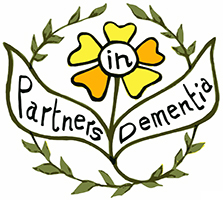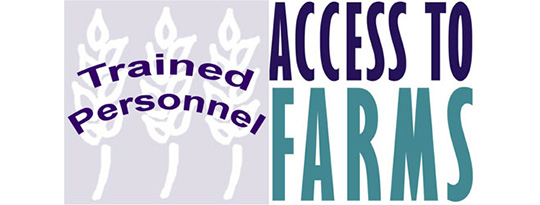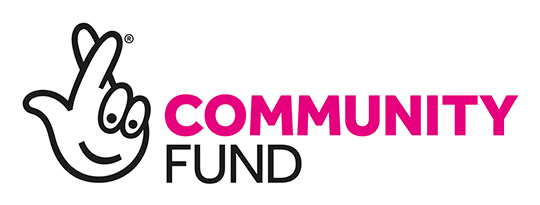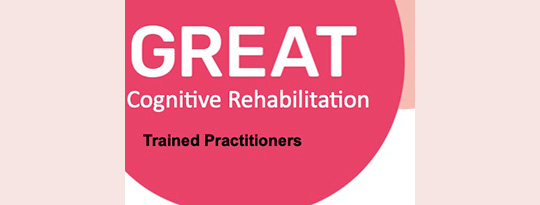Journal of Dementia Care Article: Cognitive Rehabilitation in the Community
This article was published in the Journal of Dementia Care in January 2025.
Here is a link to the journals website: https://journalofdementiacare.co.uk
Billie, Brenda, Mike, Lynne, Chris, Lorraine and Justin reflect on the delivery of a Cognitive Rehabilitation project in the community.
Introduction
‘Partners in Dementia’ (www.partnersindementia.org), a York based social enterprise worked with 18 people with dementia and their care partners to deliver a Cognitive Rehabilitation (CR) pilot project. In this article, six participants have written about their experiences and CR advanced practitioner (Justin) also shares some learnings from the project. Partners in Dementia are known locally for a social farming service for people with dementia. CR training enabled us to aim to help establish CR in York by providing an accessible toolkit to support its delivery. CR is typically delivered by Occupational Therapists from clinical settings and to date there was no known delivery of CR from a community organisation.
CR Research
Great CR is an evidence based approach that supports people with mild to moderate dementia to function at the highest possible level in relation to specific meaningful (SMART) goals and is recommended for people with dementia in the NICE guidelines. Great CR built on over two decades of research at the University of Exeter and other leading dementia research centres, culminating in the GREAT trial in 2018: https://sites.google.com/exeter.ac.uk/great-cr/research-evidence/great-trial?authuser=0; and followed by the GREAT into Practice implementation project: https://sites.google.com/exeter.ac.uk/great-cr/research-evidence/great-ip-an-implementation-project?authuser=0
CR Pilot Project in York
We were awarded a small £8k grant from the National Lottery to deliver 18 CR interventions and three CR based ‘My Life, My Goals’ exploratory group sessions (not discussed here). The project was delivered by Justin with Supervisions by CR researcher Jackie Pool. We aimed for a six month delivery timeframe, but this was increased to one year after referrals were initially very slow. Referrals eventually came from the Memory Service, Social Services and internally via our social farm. A wide range of goals were chosen by the participants with dementia, reflecting what is important to them.
Examples of goals chosen by participants during the CR pilot project:
I will be able to….
-
-
- know what plans I have on any given day.
- go to the Sporting Memories club once a week by bus with a companion.
- play memory games and other games I enjoy twice a week with my husband.
- take my medication independently without the help of my husband.
- look after my flowers and plants at least once a week.
- be able to use my mobile phone to make and receive calls.
- make a photo album to pass on to my granddaughter.
- learn strategies to communicate with my family, friends and others.
-
Results of the CR Pilot Project
The person with dementias goal attainment was assessed by all stakeholders using the Bangor Goal-Setting Interview (Short version) before and after the CR intervention. Overall the participants goal attainment showed significant improvement after the CR interventions, very similar to the improvements shown in the GREAT into Practice implementation project. In our CR pilot project, participants started with an average (mean) goal attainment of 2.67 / 10 and ended with a goal attainment averaging 7.58 / 10, demonstrating improvement in their ability to perform their chosen goal activity.
The CR Process
See this link: https://sites.google.com/exeter.ac.uk/great-cr/cognitive-rehabilitation/process?authuser=0
Participant Reflections on CR
Below are four case studies written in collaboration with the CR project participants to help understand their experience of CR. We start with Billie, who lives alone in a sheltered housing complex in York.
Billie’s Story
My Mother
“‘They put her away’. That was the phrase. My father was embarrassed. She was trying to find her way. Nobody would do that now. You don’t tell anybody about that. We didn’t have the phrase [dementia]”.
Dementia
“I’d also having trouble with speaking for quite a long, maybe three years or so, and then it hots up. It’s obviously more difficult to report on yourself. I didn’t know, but I was looking for it [dementia] because of my mother. I don’t think the actual evidence is before 50 [years old] except from time to time”.
Cognitive Rehabilitation
[Below are the goals I decided to work towards]
- I will learn strategies to help when speaking and reduce anxiety: “I didn’t use it very much because I was too busy going down and I really needed to go up if you know what I mean (speaking strategies are things like describing things in a different way when stuck finding a word). I found [breathing practices] that very useful. It was easy to do it and just stop what you’re doing. Its helps you to step away from what you’re doing now. I find it fairly easy to adapt at that stage. It’s something that you go to quite normally”.
- I will be able to locate my important items whenever I need them: “That was good. If things are good I go (picks keys up from safe place); when I get home I do this (puts keys down in safe place)”.
People I’m With
“And also I think the kind of people I’m with mostly are willing to encourage me to do what I can do. If I say ‘can you pass me the sugar’ and I can’t say it, I can say ‘Oh dear, we’ll try again’. They are very supportive. Better than I thought it would be”.
Brenda also lives alone in a village near York and wrote this piece about her experiences of CR:
Brenda’s Story
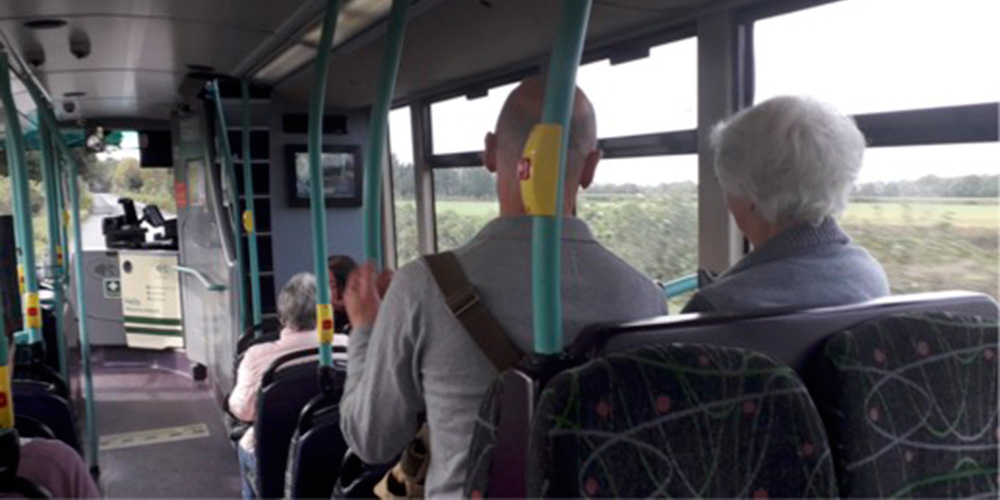 Brenda practicing using the bus with the Cognitive Rehabilitation Practitioner
Brenda practicing using the bus with the Cognitive Rehabilitation Practitioner
A Life Changing Experience
The day my GP told me she thought I had dementia was interesting- no more than that and I’m still interested to experience its development. My recollection of the start of my new life was when I had a car accident – not my fault! The insurance company paid up. I was admitted to hospital overnight to find I had no injuries and was sent home. I went to play bridge the following Monday (as usual) and I found it meant nothing to me. I collapsed on the bridge table and others brought me home. That was the end of my bridge and the end of an era. Good friends and family kept me going. I was frightened to go outside alone and have been brought home by strangers more than once (thank heaven I live in a little village where everyone knows me).
Cognitive Rehabilitation and My Goals
I will be able to:
- catch the bus independently to my nearby village to attend an exercise class once a week.
- know where my important items are any time I need them (keys purse, phone etc.).
Justin from Partners in Dementia was introduced to me and we embarked together on a Cognitive Rehabilitation journey. One difficulty for me was travelling alone on the bus using the timetable. Without the car I can’t leave the village. So we started working towards that. Before I could get the bus Justin reminded me what I needed to take, e.g. purse, mobile, diary, keys. We practiced this exercise with Vicki, my carer, when Justin wasn’t there. We walked to the local bus stop, checking for landmarks on the way to remind me how to get there. We repeated the exercises over 6-8 weeks until I didn’t need the reminders. That was a good exercise when broken down into little bits.
How I Felt During Cognitive Rehabilitation
I felt listened to, excited by being independent – the repetition made me aware of what was to come next. Justin’s rehabilitation therapy awakened my memory on how to use public transport. It gave me the confidence to leave the house safely with items necessary for me and walk to the bus stop feeling confident. It also gave me confidence in walking in my village as I recognised landmarks and a set routine for walking. This has also helped me to use the village shop- again in confidence, feeling safe to leave the house and be able to get home safely. I wasn’t prepared to get on the bus on my own. I was frightened of it. I was scared to go and then to get on the bus. And that was what we overcame really. I walked through the hot coals! There is a name for it- facing up to your demons.
I have to say that it’s the very fact that you’re there. I know that you weren’t always with me. Its like when the doctor visits and and you feel oh thank goodness. It’s a bit like that really. But then you’re OK. Meeting you was opening a window really to show me through the window. There was so much there I needed but didn’t know I needed it. But it was there and it was wonderful and I wanted it. It became available to me.
The Future
My aim was to go to keep fit class on the bus but then I discovered I couldn’t keep fit. There were too many people in the class so couldn’t get the help I needed. It was embarrassing as I couldn’t balance, therefore was not able to join in. I think if the keep fit class was tailored for all I’d still be using the bus.
I intend to go to the singing group. I’ll do anything that makes my brain come back and makes the fog go away. I’ve started knitting a sweater so lets see what happens now!!
Mike and Lynne were initially referred into the My Life, My Goals workshops. Here is their contribution:
Mike and Lynne’s Story
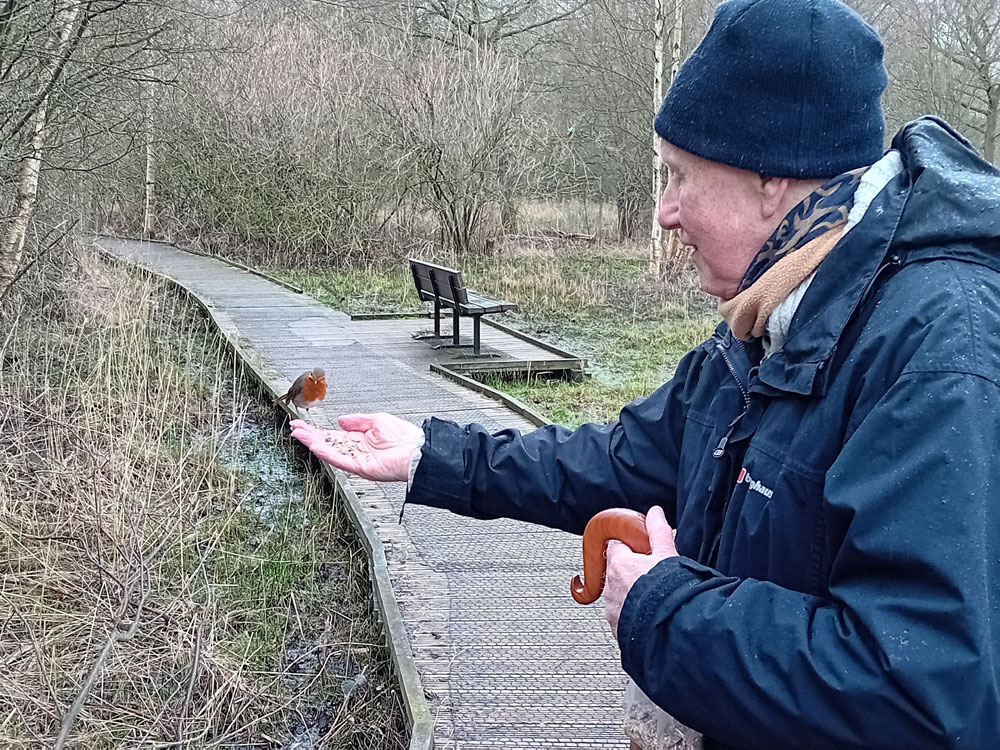
My husband, Mike, was diagnosed with Alzheimer’s last year. Whilst attending a ‘My Life, My Goals’ workshop Justin offered us 8 home based sessions of Cognitive Rehabilitation. The aim was to choose relevant and achievable goal/s and identify small steps needed to work towards their completion. Initially Mike found the selection of goals quite overwhelming, causing him some anxiety: “ I thought it would be easy but I struggled with the openness of the questions. I found it difficult to choose appropriate goals” (Mike). After discussing what he wanted to achieve we narrowed the choice and found goals with which he felt comfortable. His recovery from a knee operation lead to an exercise based first goal: I will be able to walk independently to the local nature reserve or village and back at least twice weekly. The second goal was safety based as Mike would be walking alone: I will be able to make and receive calls on my mobile phone.
Each session consisted of a goals recap, walks of gradually increasing length or some practise using his phone. Justin suggested using a mnemonic to enable Mike to remember everything needed to go walking. One of Mike’s weekly tasks on the farm (another service he attends) is feeding the pigs, hence the mnemonic ‘We Keep Spotty Pigs’ (weather-clothing, keys, sticks and phone). Initially difficult to grasp, the constant repetition each time he left the house lead to knowing it needed to be used, even if he could not always remember all items. Mike reflected: “[It was] fine, [I] got to grips with mnemonic. Quite successful- took everything I needed [for my walks.
Every week the walking distance improved and both destinations were eventually reached. Mike also phoned home as he reached the turning point to indicate starting the return trip. Mike reflected “It has improved my confidence when walking, knowing that I am able to contact home if needed. It has made me more secure and prepared when going for a walk … more motivated and I have met people whilst walking”.
Overall we would both recommend Cognitive Rehabilitation to other people living with dementia. Although the process was stressful at times and elements difficult, the drip feed and patient process proved to be successful for both of Mike’s goals and he continues to strive for further improvement.
Chris and Lorraine live in a village outside of York. Here’s their story:
Our Story

Background
Childhood sweethearts, we both took early retirement after years of committed hard work in two very different professions. Since then, we have experienced five life changing events followed by Chris’s diagnosis of early onset dementia.
Cognitive Rehabilitation
It was a complete fluke that we found out about this service. The relationship between us and Justin was important. It has been positive from day one. It offered us a level of service that we ourselves always delivered. “We had a television which our son brought us for our Ruby wedding anniversary and I couldn’t use it. I were really frightened. I thought I’d break it. He spent so much money on it” (Chris).
Chris’ Goal: I will learn how to turn the tv on and off and choose my favourite tv channels.
It was a very personal adaptation to the television control. For example, working together on how to make that ‘home button’ easier- we added glitter! Working with Justin has been part of a jigsaw of services that has helped Chris to move forward over the past few months. It also fits into family life. It’s all been such a positive experience. One day I came home and Chris was chuffed because he had turned the television on. He excitedly said “I did it”. He was so happy to tell our son, Ross, that the gift he had given us, Chris could now use. “I couldn’t do it and now I know it doesn’t break. Well, it’s still here and it’s working!” (Chris)
Discussion
The project participants chose a variety of goals and were motivated to increase independence, keep physically active, manage difficulties and remain socially connected. These case studies highlight some of the potential benefits and challenges for participants and staff who engage in CR work. The benefits to participants sometimes expanded beyond the goal itself. For instance, Brenda spoke of the confidence that the work instilled in her, helping her to do more in her community, whilst keeping safe. In some cases participants have been initiating more than they were before CR, e.g. deciding to go for a walk. CR was also seen as a useful service to incorporate alongside other services, such as for Chris and Lorraine, all working together in a sense to increase independence and maintain wellbeing. Care partners also learnt skills during the CR process and felt able to use these to problem solve on other goals.
There were various challenges when delivering CR. Some goals were not able to continue easily after the intervention ended. For example, there was a six month waiting list for a respite service to enable a participant to continue to go to a social group. This showed that there is sometimes a need for staff to do more research before goals are committed to. Furthermore, some families were not able to engage in taking on more ‘work’, so some referrals did not lead to ongoing engagement. Some participants with dementia also found the CR concepts difficult to understand and that made it hard for them to be fully involved.
Following On
Funding for CR provision is not available in many parts of the UK, including York, even though it is recommended for people with dementia in the NICE guidelines. We set up a steering group which included participants and other stakeholders. Although some private care providers from this group committed to training their staff in CR, there was a consensus that CR should be available free of charge so that it is equally available to all who could benefit. We are looking into applying for another fund to deliver CR on a larger scale.
Implications For Practice
How viable CR is to other community organisations depends largely on funding and a commitment to a rehabilitation approach for people with dementia. CR practitioners also require supervision, especially when new to CR and a structure for this does not currently exist.
Key Points
- Community organisations can support the delivery of CR, with similar standards to clinical teams. Supervisions are an important factor in this outcome.
- Goals are sometimes difficult to come up with and can cause stress.
- Participants confidence often grows throughout the process as improvements are experienced.
- CR can enhance and enable physical rehabilitation, e.g. post operation, as it did with Mike.
- CR works as a component of a range of services which together promote greater independence as well as wellbeing, as in Chris and Lorraine’s case study.
Current CR Training Requirements (NHS portal / Exeter University)
There are two options to access CR E-Iearning training:
- For anyone in the UK with an NHS or University email address who registers for a free account: https://learninghub.nhs.uk/
- For other users via the GREAT website https://sites.google.com/exeter.ac.uk/great-cr/ for-practitioners/elearning-course?authuser=0
Suitable for health and social care practitioners, assistants and trainees involved in the direct care of people with dementia, including occupational therapists, nurses, psychologists and senior support workers. Managers who support practitioners may aIso find the course useful.
